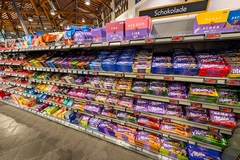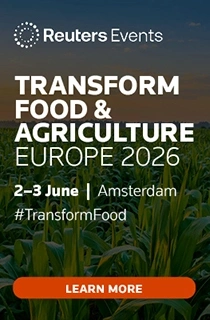
- Industry news
Industry news
- Category news
Category news
- Reports
- Key trends
- Multimedia
- Journal
- Events
- Suppliers
- Home
- Industry news
Industry news
- Category news
Category news
- Reports
- Key trends
- Multimedia
- Events
- Suppliers
Dairy crisis: “Milk-spraying” protests polarize sector as producers push for EU-wide production cuts

06 May 2020 --- Divisive dairy demonstrations are taking place tomorrow across Europe as producers protest against the European Commission’s “misguided” way of mitigating the milk crisis. Instead of coordinated production cuts at EU level to rebalance oversupply in the market and mitigate coronavirus-related market volatility, the EC is offering private storage subsidies to producers to alleviate price pressures on producers who could then save quantities of milk powder, butter and cheese. This has angered some in the sector leading to a series of protests which will see milk powder sprayed across fields as a “symbolic” action. However, others have differing views, flagging the food waste element of these types of actions.

“It shouldn’t be seen as food waste action but rather as a symbolic action to draw attention to the misguided decisions of the EC,” Vanessa Langer, Communications Officer for the European Milk Board (EMB), tells FoodIngredientsFirst.
 The curbing of endemic food waste is an issue that global dairy sector stakeholders have been actively pursuing, with consumers echoing a shared sentiment.“The campaigns will be held in eight European countries in total. There will be some campaigns in Belgium, Germany, France, Italy, Denmark, Lithuania, Luxembourg and the Netherlands, she details. “Most of the participants plan to use machinery to spray the milk powder onto fields so that you have quite an impressive picture of the milk powder being sprayed. While that is the case in most countries, in Germany they have quite a different campaign. They are constructing a pyramid made out of milk powder,” she adds.
The curbing of endemic food waste is an issue that global dairy sector stakeholders have been actively pursuing, with consumers echoing a shared sentiment.“The campaigns will be held in eight European countries in total. There will be some campaigns in Belgium, Germany, France, Italy, Denmark, Lithuania, Luxembourg and the Netherlands, she details. “Most of the participants plan to use machinery to spray the milk powder onto fields so that you have quite an impressive picture of the milk powder being sprayed. While that is the case in most countries, in Germany they have quite a different campaign. They are constructing a pyramid made out of milk powder,” she adds.
However Alexander Anton, Secretary General of the European Dairy Association, conveys an opposing sentiment. “Spraying milk on fields and hence wasting milk is more than a waste of hard work and precious resources. It is an irresponsible way to catch attention – which is the objective of this action, to ‘capture some striking images’ as the EMB puts it,” he tells FoodIngredientsFirst.
“Our assessment is obviously also shared by some of the involved organizations, that have opted for adequate communication events to voice their ideas, like the building up of a milk-powder bag pyramid in Berlin,” he highlights.
Pekka Pesonen, Secretary General of the European agricultural body Copa-Cogeca also responds, “Covid-19 threatens food security all around the world. This has been clearly stated by the UN and FAO for instance. Also, in Europe farming community produces high quality, nutritious food that is based on a long-term investments and commitments of the farmers themselves. Destroying or wasting food is not what we could accept, in particular in a situation with the disease outbreak. Markets are deteriorating and we expect that the EU takes action accordingly. We have the tools in the Common Agricultural Policy (CAP).”
The curbing of endemic food waste is a target that global dairy sector stakeholders have been actively pursuing. In the UK, for instance, competition rules have been relaxed during the ongoing pandemic to allow retailers, suppliers and logistic services to work together to mitigate the risk of surplus milk going to waste.
At the consumer-end of the spectrum, 57 percent of UK consumers have revealed that they value food more now, but almost half (45 percent) are more worried about food compared to pre-pandemic times, according to a survey led by environmental charity Hubbub.
 The EMB has explained its position to the EC, detailing the difficult circumstances producers are facing and warning politicians that the dairy market will collapse unless effective measures are activated. Activating private storage aid without production cuts
The EMB has explained its position to the EC, detailing the difficult circumstances producers are facing and warning politicians that the dairy market will collapse unless effective measures are activated. Activating private storage aid without production cuts
The EC is addressing the milk crisis through the activation of private storage aid and without coordinated production cuts across nations within the bloc, remains the point of contention among the stakeholders.
“The decision to address the milk crisis with the activation of private storage aid and without coordinated production cuts at EU level is wrong,” echoes Erwin Schöpges, EMB President.
“While the EU market is flooded with milk and prices are in a downward spiral, an EU-wide reduction in the amount of milk produced is the only thing that could bring market relief. Putting processed products like milk powder, butter and cheese in storage will not reduce the price pressure for dairy farmers as those products remain part of the excess supply of milk products,” the EMB contends.
The EMB has explained its position to the EC, detailing the difficult circumstances producers are facing and warning politicians that the dairy market will collapse unless effective measures are activated.
Earlier this month, Europe’s dairy and livestock sectors spoke out about “deteriorating” market conditions. Producers and their cooperatives were demanding urgent action from the EC including calls for extraordinary measures to mitigate sinking demand as a result of the mandatory lockdowns.
By Benjamin Ferrer










